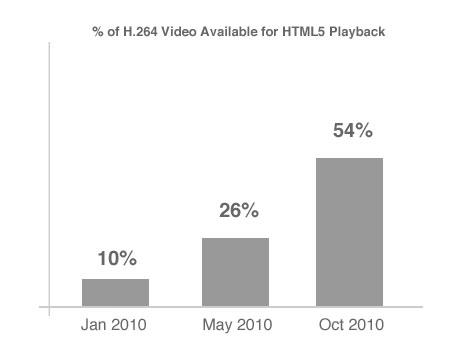More than half of online videos are now in iOS-friendly HTML5 (H.264)
MeFeedia revealed on Wednesday that more than half of the web's video are now available for playback in HTML5, a number that has more than doubled in the past five months. It's also a significant increase from the 10 percent availability seen in January 2010.
The survey found that Flash remains the dominant player on traditional PCs, but mobile devices like the iPhone and iPad (which don't support Flash at all) are driving HTML5 video adoption. Many publishers and platforms are now using the iframe tag instead of the "object" tag, allowing the source to serve a video format optimized for each device.
MeFeedia's findings were based on the company's index of videos from over 33,000 different publishers. It includes content partners such as Hulu, CBS and ABC, as well as online video destinations like YouTube, Vimeo and DailyMotion.
"Alongside mobile growth, we expect that most video sites will follow this trend," the report said. "We are also seeing an increase in ad formats, services, advanced players & the use of canvas combined with video."
Apple and Adobe have been at odds since 2007, when the iPhone was released without support for Flash. The conflict escalated this year with the release of the iPad, and Apple's refusal to allow Flash on it or other iOS-powered devices.
The feud gained considerable steam this year after Apple Chief Executive Steve Jobs published an open letter criticizing Flash as old technology that is unfit for the modern era of mobile computers. The CEO also said that Flash is the number one reason for crashes on the Mac platform.
Adobe fired back and said that any crashes of Flash in Mac OS X are not related to its software, but are instead the fault of Apple's operating system.
This month Apple stopped preinstalling Adobe Flash on its Mac computers, starting with the new MacBook Air. Apple explained the change by stating that requiring users to install Flash on their own ensures that they will always have the latest and most secure version of the software.
Microsoft hasn't preinstalled Flash on Windows PCs since the shift to Windows Vista in 2007.
 Katie Marsal
Katie Marsal











 Malcolm Owen
Malcolm Owen
 William Gallagher and Mike Wuerthele
William Gallagher and Mike Wuerthele
 Christine McKee
Christine McKee
 William Gallagher
William Gallagher

 Marko Zivkovic
Marko Zivkovic









